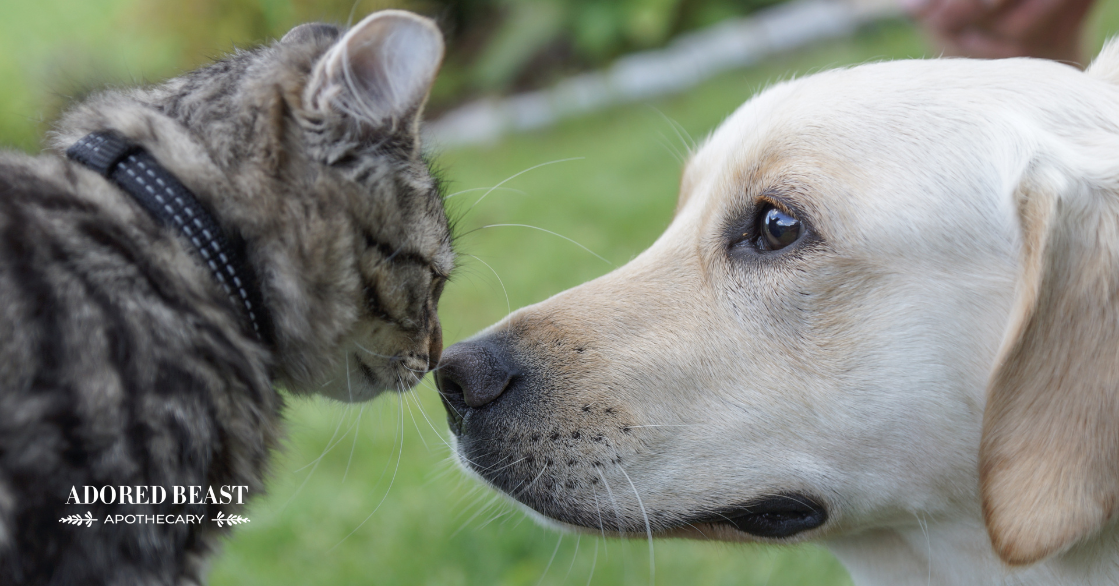I’m sure you’ve heard about glucosamine, and its many benefits. It’s often what pet parents (and veterinarians) turn to to help protect the joints.
But have you heard about n-acetyl glucosamine for dogs and cats? It’s not the same as glucosamine, but it is related. And while it isn’t usually what you’d reach for for joint health, it does have some other incredible benefits for your animal’s health.
Today, we’re talking about n-acetyl glucosamine, also known as NAG, and why it’s an ingredient that we love, love, love.
What is NAG?
Let’s start with a little science.
When we said n-acetyl glucosamine was related to glucosamine, that’s because it is a form of glucosamine. N-acetyl glucosamine is an amide derivative of the monosaccharide glucose. It is a secondary amide between glucosamine and acetic acid. Instead of a sulfur (glucosamine sulfate) or chloride molecule (glucosamine hydrochloride), NAG has a larger, more complex molecule attached to it.
N-acetyl glucosamine is an extract of chitin, which is the molecule that forms the outer shells of shellfish, but it can also be made in a lab.
Ok, enough with the science. We know what you’re really interested in are the benefits of n-acetyl glucosamine for dogs and cats.
N-Acetyl Glucosamine for Dogs and Cats
We love NAG for a few different reasons, but our two biggest are how it helps gut health and urinary tract health.
Gut Health
You probably know that here at Adored Beast we’re all about the gut. After all, as much as 80% of the immune system is located in the gut. When the gut isn’t healthy, the rest of the body can’t be healthy.
And there’s a ton of research that shows how helpful n-acetyl glucosamine can be for improving gut health.
First off, NAG has been known to provide a protective effect on the lining of the stomach and intestines. It really works its magic on smooth muscle and the mucosal lining. Studies indicate that NAG may help restore the formation of protective structures in the gut and it may also help to increase the elasticity of tissues surrounding vessels.
Additionally, research shows that NAG can help to improve the bacterial populations in the gut, specifically with crowding out harmful bacteria such as e.coli.
N-acetyl glucosamine for dogs and cats may also be helpful for inflammatory bowel disease, ulcerative colitis and Crohn’s disease. This is because it can reduce inflammation in the digestive system and improve symptoms of irritable bowel disease. In fact, research in humans shows that NAG helped with IBD symptoms, including pain and diarrhea.
Bladder Health
In many of the same ways NAG helps the gastrointestinal system, it also helps the unitary tract. It really helps keep the lining of the urinary tract healthy and strong
N-acetyl glucosamine offers structural support to the bladder lining acting as a natural barrier to protect the underlying urinary tract layers. It can also help to decrease inflammation and pain in the bladder, urethra, and sphincter. It works to decrease inflammation of the lining of the urethra and the bladder walls.
NAG can be particularly helpful for interstitial cystitis, a condition that causes chronic pain and inflammation in the bladder and urinary tract. Cats with IC have lower urinary plasma and urine glycosaminoglycan (GAG) concentrations-to-creatinine concentration ratios than those without, and research shows that NAG significantly increased plasma GAG concentrations, which can be incredibly helpful.
With regard to maintaining urinary health, NAG can help encourage a normal pH balance. Cats are especially vulnerable to pH problems. When pH is too high or too low, crystals can form in a cat’s urine. Since urine pH can be directly related to developing crystals in the urinary tract, that’s important.
Lung Support
Because it supports smooth muscle, n-acetyl glucosamine can also be incredibly beneficial to the lungs. In much the same way it supports the gastrointestinal and urinary systems, it can also support the respiratory system.
N-acetyl glucosamine plays an important role in mammalian lung development, and is crucial in many biological and pathological phenomena.
As far as lung support in grown dogs and cats, its potential as part of anti-inflammatory therapy could represent a safe and efficient treatment for respiratory virus infections. Its antiviral activity has been shown to be capable of inhibiting the inflammatory response induced by viral infection.
It can also be beneficial for dogs, cats, and horses with respiratory allergies, for COPD (also called heaves in horses. It can also be supportive for upper respiratory and mucus membranes in brachycephalic breeds dogs like bulldogs, pugs, and boxers to help combat sinus, lung, and trachea inflammation. For acute kennel cough, it is also helpful to reduce and sooth inflammation in the respiratory system.
Additionally, research has even shown that it has potential with regard to cancer therapy, as it has been shown to sensitize cancer cells to trial-induced apoptosis (cell death).
There are so many ingredients found in nature that we can turn to for our animals’ health. One such ingredient is n-acetyl glucosamine for dogs and cats. Mother Nature really does provide us with so many answers, and we try to turn to her for solutions whenever we can.












